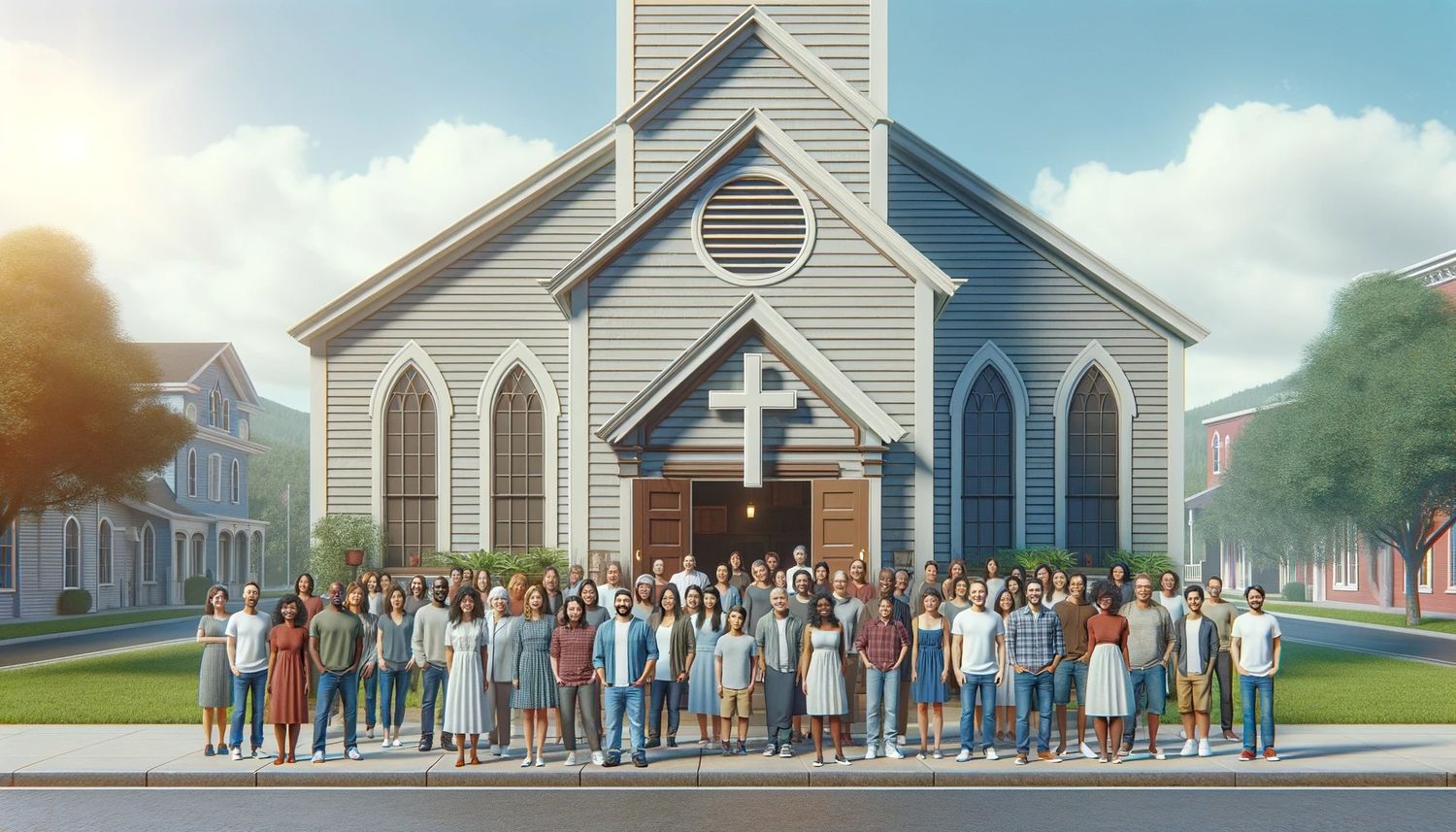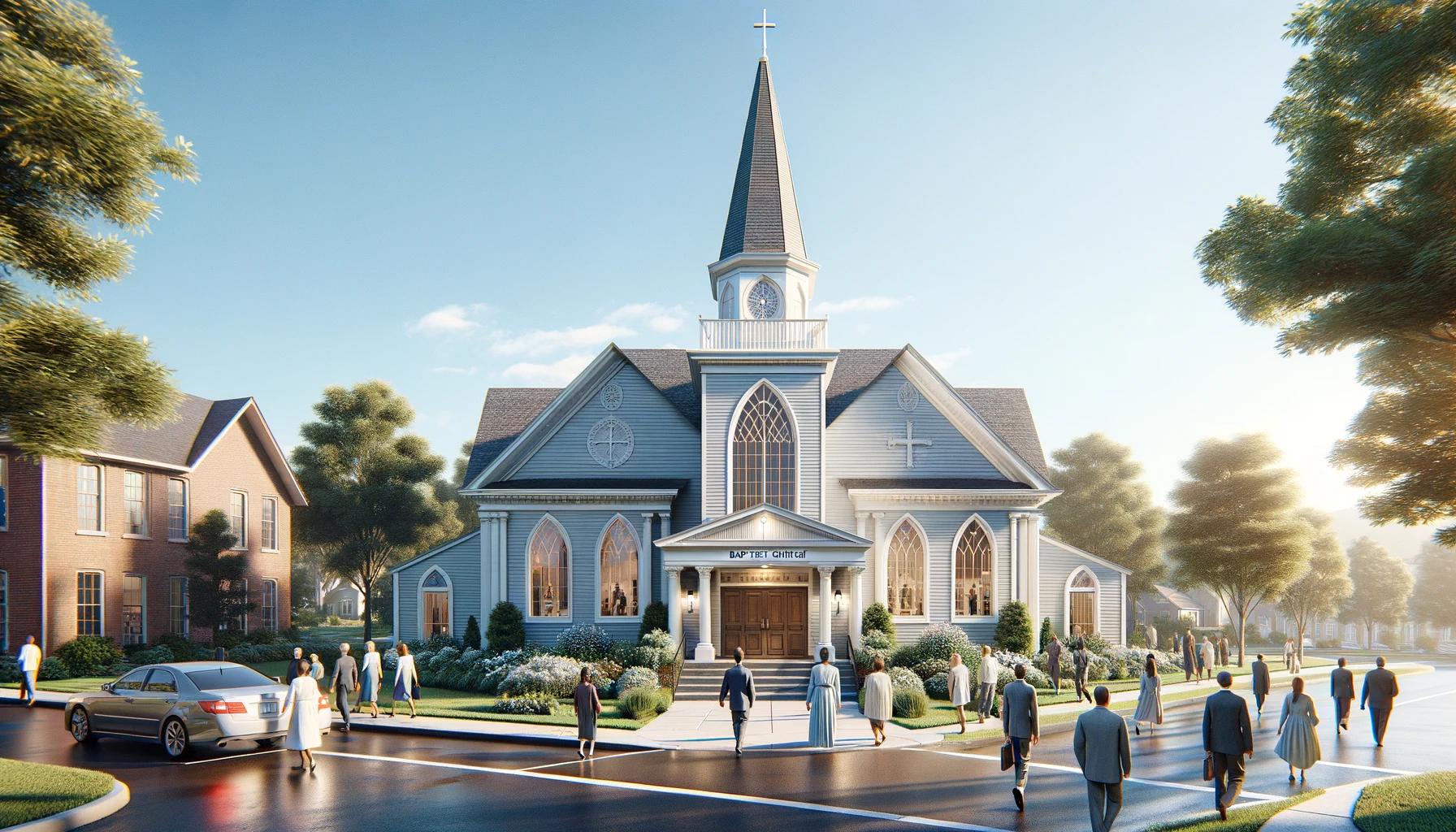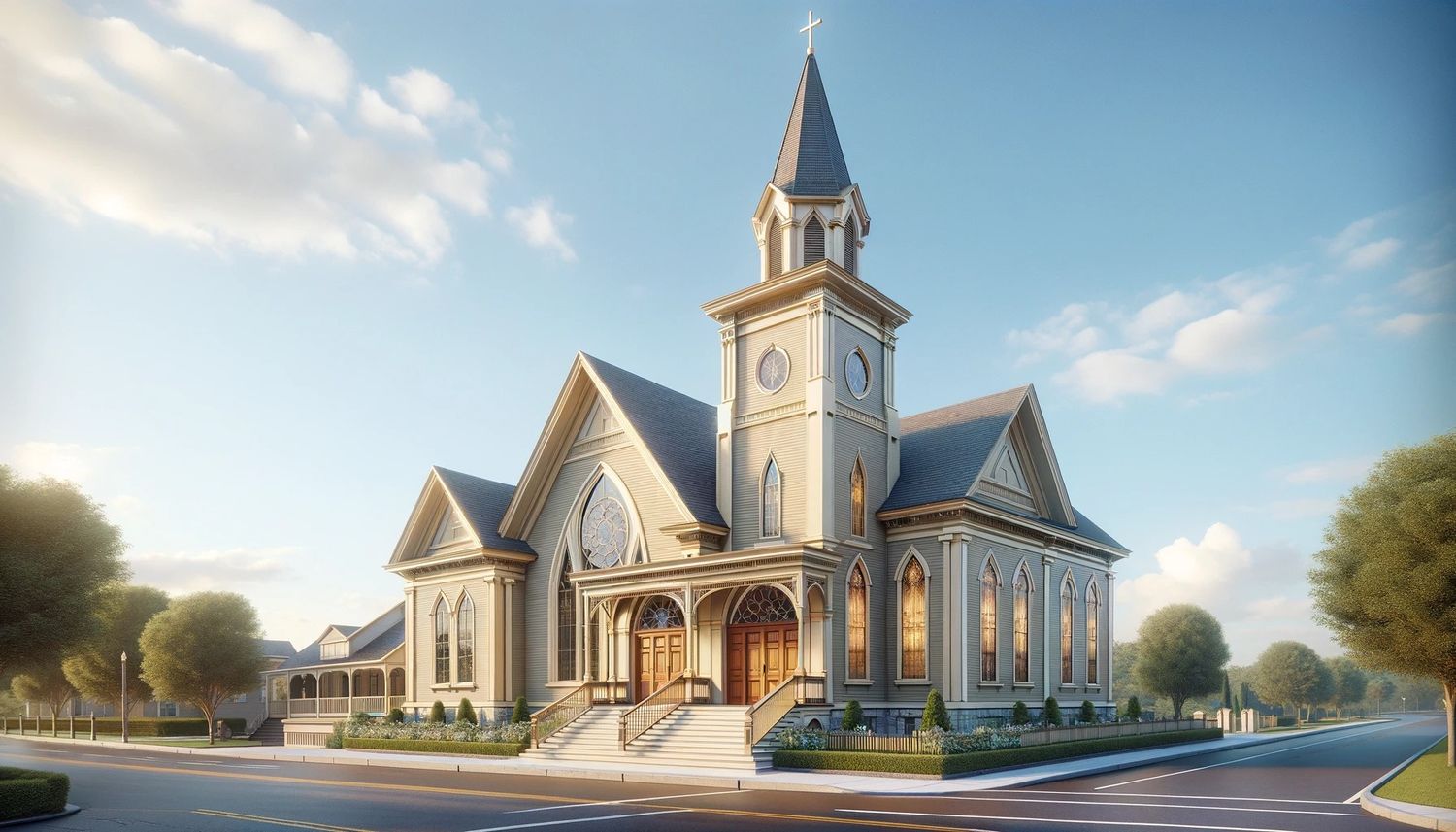Home>Theology and Spirituality>Why Is The Baptist Church Declining


Theology and Spirituality
Why Is The Baptist Church Declining
Published: February 23, 2024
Jason DeRose, Managing Editor at Christian.net, uses his expertise in religion and journalism to deepen understanding of faith's societal impacts. His editorial leadership, coupled with a strong academic background, enriches the platform’s diverse content, earning him recognition in both journalism and religious circles.
Discover the reasons behind the decline of the Baptist Church and explore the impact on theology and spirituality. Gain insights into the challenges and potential solutions.
(Many of the links in this article redirect to a specific reviewed product. Your purchase of these products through affiliate links helps to generate commission for Christian.net, at no extra cost. Learn more)
Table of Contents
Introduction
The Baptist Church, a significant denomination within Christianity, has played a pivotal role in shaping religious landscapes and societal norms. With a rich history dating back to the 17th century, the Baptist Church has been a beacon of faith, community, and social justice. However, in recent years, there has been a noticeable decline in the influence and membership of the Baptist Church. This decline has sparked discussions and raised concerns about the future of this esteemed institution.
The Baptist Church has long been synonymous with fervent evangelism, unwavering convictions, and a commitment to individual freedom and autonomy in matters of faith. Its emphasis on believer's baptism, congregational governance, and the authority of scripture has distinguished it within the broader Christian tradition. The church's impact has extended beyond the spiritual realm, influencing political and social movements, particularly in the United States and other parts of the world.
As we delve into the factors contributing to the decline of the Baptist Church, it is essential to recognize the complex interplay of internal and external dynamics. From shifting cultural and societal trends to internal challenges within the denomination, various forces have converged to shape the current landscape. Additionally, the pervasive influence of technology and social media has introduced new opportunities and challenges for religious institutions, including the Baptist Church.
In this article, we will explore the historical significance of the Baptist Church, the multifaceted factors contributing to its decline, and potential strategies for revitalization and growth. By gaining a deeper understanding of these dynamics, we can shed light on the evolving role of religious institutions in contemporary society and the enduring relevance of the Baptist Church in the midst of change.
Historical Overview of the Baptist Church
The roots of the Baptist Church can be traced back to the early 17th century, amidst a backdrop of religious and political upheaval in Europe. Emerging as a dissenting movement within Protestantism, the Baptist tradition was characterized by a steadfast commitment to principles such as believer's baptism, congregational autonomy, and the separation of church and state. These foundational beliefs set the stage for the development of a distinct and influential Christian denomination.
The Baptist Church's historical narrative is intertwined with the pursuit of religious freedom and the rejection of infant baptism in favor of believer's baptism, a practice symbolizing a personal commitment to faith. This emphasis on individual agency and the priesthood of all believers has been a defining feature of the Baptist tradition, fostering a sense of empowerment and responsibility among its members.
Throughout the centuries, the Baptist Church has been a catalyst for social change, advocating for religious liberty, abolitionism, and civil rights. Its commitment to the autonomy of local congregations has nurtured a diverse array of theological perspectives and worship styles, contributing to the vibrancy and adaptability of the denomination.
The Baptist Church's global footprint has expanded significantly, with missionary endeavors and evangelistic efforts reaching diverse cultures and communities. This outward focus has underscored the denomination's evangelistic zeal and commitment to spreading the Christian message worldwide.
In the United States, the Baptist Church has played a pivotal role in shaping the nation's religious landscape and political discourse. From the First Great Awakening to the Civil Rights Movement, Baptist leaders and congregations have been at the forefront of pivotal moments in American history, advocating for social justice and moral reform.
As the Baptist Church evolved, various subgroups and associations emerged, reflecting a spectrum of theological emphases and ecclesiastical practices. This denominational diversity has contributed to the richness and dynamism of the Baptist tradition, fostering a spirit of innovation and adaptability.
The historical trajectory of the Baptist Church reflects a legacy of resilience, conviction, and a commitment to the core tenets of the Christian faith. Its enduring influence and contributions to religious, social, and political spheres have left an indelible mark on the tapestry of human history, positioning the Baptist Church as a significant force within the broader Christian tradition.
Factors Contributing to the Decline
The decline of the Baptist Church can be attributed to a confluence of multifaceted factors that have shaped the religious landscape in recent years. These factors, operating at both internal and external levels, have exerted a profound influence on the vitality and relevance of the denomination.
Shifting Cultural and Societal Trends
The Baptist Church has encountered significant challenges stemming from shifting cultural and societal trends. In an era marked by increasing secularization and diversification of religious beliefs, traditional denominational affiliations have faced heightened scrutiny and competition. The rise of a more secular and pluralistic society has posed challenges to the church's ability to engage and resonate with a rapidly evolving demographic landscape.
Internal Challenges within the Baptist Church
Internal challenges within the Baptist Church have also contributed to its decline. Disputes over theological interpretation, ecclesiastical governance, and social issues have led to internal divisions and fragmentation within the denomination. These internal conflicts have strained the unity and coherence of the Baptist community, impacting its ability to present a cohesive and compelling vision to both members and the broader society.
Read more: Why The Westboro Baptist Church Protests
Impact of Technology and Social Media
The pervasive influence of technology and social media has presented both opportunities and challenges for the Baptist Church. While digital platforms offer new avenues for outreach and communication, they have also reshaped patterns of religious engagement and community formation. The increasing prevalence of online religious resources and virtual communities has redefined the traditional modes of religious participation, posing a significant adjustment for established religious institutions.
Economic and Demographic Shifts
Economic and demographic shifts have also played a role in the decline of the Baptist Church. Changing economic realities and demographic patterns have reshaped the geographic distribution and composition of congregations, posing logistical and financial challenges for many local churches. Moreover, generational differences in religious affiliation and participation have impacted the sustainability and growth of the denomination.
Evolving Religious Landscape
The evolving religious landscape, characterized by the rise of non-denominational and independent Christian expressions, has presented a competitive environment for traditional denominations like the Baptist Church. The proliferation of alternative spiritual pathways and the blurring of denominational boundaries have reshaped the religious marketplace, requiring established denominations to adapt and innovate in order to remain relevant and appealing to contemporary seekers.
In navigating these complex and interrelated factors, the Baptist Church faces the imperative of addressing these challenges while remaining faithful to its core convictions and mission. By acknowledging and engaging with these dynamics, the denomination can chart a path toward revitalization and relevance in an ever-changing religious and cultural milieu.
Changing Cultural and Societal Trends
The Baptist Church has encountered significant challenges stemming from shifting cultural and societal trends. In an era marked by increasing secularization and diversification of religious beliefs, traditional denominational affiliations have faced heightened scrutiny and competition. The rise of a more secular and pluralistic society has posed challenges to the church's ability to engage and resonate with a rapidly evolving demographic landscape.
One of the prominent cultural shifts impacting the Baptist Church is the trend towards secularization. As societies embrace a more secular worldview, traditional religious institutions, including the Baptist Church, have experienced a decline in influence and relevance. The emphasis on individual autonomy and the prioritization of secular values have reshaped the spiritual priorities of many individuals, leading to a decreased emphasis on formal religious affiliations.
Moreover, the diversification of religious beliefs and practices has contributed to a more pluralistic religious landscape. The Baptist Church, rooted in specific theological convictions and ecclesiastical traditions, has encountered challenges in navigating this diverse religious tapestry. The proliferation of alternative spiritual pathways and the blurring of denominational boundaries have reshaped the religious marketplace, requiring established denominations to adapt and innovate in order to remain relevant and appealing to contemporary seekers.
Furthermore, the evolving demographic composition of society has influenced the cultural trends impacting the Baptist Church. As demographic shifts bring about greater diversity and multiculturalism, the church must grapple with the imperative of engaging with individuals from varied cultural backgrounds and belief systems. This necessitates a nuanced approach to addressing the unique needs and perspectives of a diverse and dynamic population.
In response to these changing cultural and societal trends, the Baptist Church faces the challenge of reimagining its role and relevance in a rapidly evolving landscape. By embracing inclusivity, fostering interfaith dialogue, and adapting its outreach strategies to resonate with diverse communities, the church can position itself as a vital and inclusive spiritual resource within an increasingly pluralistic society. Navigating these cultural shifts requires a thoughtful and intentional approach that honors the Baptist tradition while embracing the evolving needs and aspirations of contemporary society.
Internal Challenges within the Baptist Church
Internal challenges within the Baptist Church have significantly contributed to its decline. Disputes over theological interpretation, ecclesiastical governance, and social issues have led to internal divisions and fragmentation within the denomination. These internal conflicts have strained the unity and coherence of the Baptist community, impacting its ability to present a cohesive and compelling vision to both members and the broader society.
The Baptist Church has grappled with theological disagreements that have led to schisms and divergent theological emphases within the denomination. Debates over doctrinal interpretation, scriptural authority, and ethical stances have created rifts among congregations and leaders, undermining the sense of doctrinal unity and shared purpose that is essential for the vitality of a religious tradition. These theological tensions have not only led to internal discord but have also affected the church's ability to engage with the broader religious landscape and address contemporary moral and ethical challenges with a unified voice.
Ecclesiastical governance has also emerged as a point of contention within the Baptist Church. Disputes over leadership structures, decision-making processes, and the balance of authority between local congregations and denominational bodies have engendered tensions and power struggles. The lack of consensus on governance models and the distribution of authority has hindered the denomination's ability to enact cohesive strategies and initiatives, leading to a sense of disarray and inefficiency in addressing the evolving needs of the church and its members.
Furthermore, the Baptist Church has faced internal challenges related to social issues, including matters of social justice, inclusivity, and ethical engagement with contemporary societal concerns. Divergent perspectives on these issues have led to internal friction and have impacted the church's ability to present a unified and impactful stance on critical social and ethical matters. The failure to address these challenges cohesively has resulted in a loss of relevance and influence, particularly among younger generations seeking a faith community that actively engages with pressing social issues.
Addressing these internal challenges within the Baptist Church necessitates a concerted effort to foster dialogue, reconciliation, and a renewed commitment to the core values and mission of the denomination. By engaging in constructive theological discourse, reevaluating governance structures, and embracing a proactive stance on social issues, the Baptist Church can navigate these internal challenges and emerge as a more cohesive, resilient, and impactful religious community.
Impact of Technology and Social Media
The pervasive influence of technology and social media has significantly impacted the Baptist Church, presenting both opportunities and challenges in the realm of religious engagement and community outreach. The advent of digital platforms and social networking has reshaped the landscape of religious participation, altering the dynamics of how individuals interact with faith communities and access religious resources.
One of the notable impacts of technology and social media on the Baptist Church is the transformation of communication and outreach strategies. Digital platforms have provided the church with new avenues for disseminating its message, engaging with congregants, and reaching out to a broader audience. Through websites, podcasts, live streaming of services, and social media channels, the Baptist Church has expanded its reach beyond physical congregations, connecting with individuals who may not have otherwise engaged with the denomination. This digital presence has facilitated the dissemination of sermons, theological resources, and inspirational content, enabling the church to extend its influence and ministry in the digital sphere.
Moreover, technology and social media have facilitated community building and connectivity among church members. Online platforms have served as virtual spaces for congregants to connect, share experiences, and support one another, particularly during times when physical gatherings may be limited. These digital communities have fostered a sense of belonging and solidarity, transcending geographical barriers and providing a platform for individuals to engage in discussions, prayer groups, and mutual encouragement.
However, the impact of technology and social media has also presented challenges for the Baptist Church. The proliferation of online religious resources and virtual communities has redefined the traditional modes of religious participation, posing a significant adjustment for established religious institutions. The shift towards digital forms of religious engagement has raised questions about the authenticity of virtual worship experiences and the potential dilution of in-person fellowship and communal worship practices.
Furthermore, the omnipresence of social media has introduced new considerations for the church, including the management of its online presence, the navigation of digital discourse on theological and social issues, and the cultivation of a meaningful and impactful digital ministry. The Baptist Church must grapple with the responsibility of stewarding its digital footprint in a manner that aligns with its core values and mission, while also leveraging the potential of technology and social media to engage with a digitally connected society.
In navigating the impact of technology and social media, the Baptist Church has the opportunity to harness these digital tools to amplify its message, foster community, and adapt to the evolving patterns of religious engagement. By embracing innovative approaches to digital ministry while upholding the integrity of its theological convictions, the church can navigate the complexities of the digital age and leverage technology and social media as instruments for advancing its mission and ministry.
Strategies for Revitalization and Growth
Revitalizing and fostering growth within the Baptist Church necessitates a multifaceted approach that addresses the complex challenges facing the denomination while leveraging its enduring strengths and values. To navigate the current landscape and position the church for sustained vitality, several strategic initiatives can be pursued.
-
Embrace Innovation and Adaptation: The Baptist Church can revitalize its ministry by embracing innovative approaches to worship, community engagement, and outreach. This may involve integrating technology into worship services, creating dynamic and interactive digital resources, and exploring creative avenues for connecting with diverse demographics. By adapting to the evolving needs and preferences of contemporary seekers, the church can expand its relevance and appeal.
-
Foster Unity and Collaboration: Addressing internal divisions and fostering unity within the denomination is essential for revitalization. Encouraging constructive dialogue, promoting a spirit of reconciliation, and prioritizing the shared mission and values of the Baptist tradition can help bridge internal divides and cultivate a cohesive vision for the future. Collaboration among congregations and leaders can amplify the impact of revitalization efforts and foster a sense of collective purpose.
-
Engage with Contemporary Issues: The Baptist Church can revitalize its relevance by actively engaging with pressing social, ethical, and justice-related issues. By articulating a clear and compassionate stance on matters such as racial reconciliation, social justice, and environmental stewardship, the church can demonstrate its commitment to addressing the concerns of contemporary society. This proactive engagement can resonate with individuals seeking a faith community that is actively involved in addressing societal challenges.
-
Empower and Equip Leadership: Investing in the development and support of church leadership is crucial for revitalization. Equipping pastors, ministers, and lay leaders with resources for effective pastoral care, visionary leadership, and strategic planning can enhance the capacity of the church to navigate complex challenges and lead with resilience and vision.
-
Cultivate Intergenerational Connections: Recognizing the diverse needs and perspectives of different generations within the church is vital for fostering growth. Creating opportunities for intergenerational mentorship, dialogue, and collaboration can enrich the communal fabric of the church and ensure that the wisdom and vitality of all age groups are valued and integrated into the church's life and mission.
-
Emphasize Discipleship and Spiritual Formation: Prioritizing robust discipleship and spiritual formation initiatives can invigorate the faith journey of congregants and deepen their commitment to the church's mission. Providing resources for spiritual growth, small group engagement, and mentorship can nurture a vibrant and committed community of believers.
By implementing these strategic initiatives, the Baptist Church can embark on a journey of revitalization and growth, positioning itself as a relevant and impactful spiritual resource within an ever-changing societal landscape. These efforts, rooted in the enduring values and mission of the Baptist tradition, can propel the church toward a future characterized by resilience, relevance, and transformative impact.
Conclusion
In conclusion, the Baptist Church stands at a critical juncture, grappling with multifaceted challenges while holding steadfast to its rich historical legacy and enduring values. The factors contributing to the decline of the denomination, including shifting cultural and societal trends, internal challenges, the impact of technology and social media, and evolving religious landscapes, have necessitated a thoughtful and proactive response from the church. However, amidst these challenges lie opportunities for revitalization, growth, and a renewed sense of purpose.
As the Baptist Church navigates the complexities of the contemporary religious landscape, it can draw strength from its historical resilience, commitment to individual freedom, and unwavering dedication to the core tenets of the Christian faith. Embracing innovation, fostering unity, engaging with contemporary issues, empowering leadership, cultivating intergenerational connections, and emphasizing discipleship and spiritual formation can serve as strategic pathways for revitalization and growth.
The church's ability to adapt to the evolving needs and preferences of contemporary seekers, while remaining faithful to its theological convictions, will be instrumental in shaping its future trajectory. By embracing inclusivity, fostering dialogue, and actively addressing societal challenges, the Baptist Church can position itself as a relevant and impactful spiritual resource within an increasingly pluralistic and interconnected society.
In the midst of change, the Baptist Church has the opportunity to reaffirm its commitment to social justice, spiritual transformation, and community engagement, resonating with individuals seeking a faith community that embodies compassion, authenticity, and a compelling vision for the future. By navigating the challenges and opportunities before it with wisdom, resilience, and a spirit of innovation, the Baptist Church can embark on a journey of revitalization, charting a course toward a future characterized by enduring relevance, transformative impact, and a steadfast commitment to the timeless message of the Christian faith.













